You would think that the election of a black president would have put a dent in one or two of the more negative black stereotypes, but the more things change, the more they stay the same. In 2009, Hollywood movies portrayed blacks as violent criminals; sexually depraved and promiscuous females; dimwitted drug dealers; fat, illiterate young people; uncaring, insensitive mothers; and observers of voodoo and black magic. Indeed, 2009 was a banner year for negative black stereotypes.
District 9, The Hangover, Precious and The Princess and the Frog in one year perpetuated just about every negative stereotype that has existed about blacks since slavery. Let’s look at the movie that disturbs me the very most: District 9. If you did not see this movie, here is a synopsis. Aliens come to earth and land above South Africa. The South Africans give the aliens a shanty town to live in that over time becomes run-down, filthy and generally uninhabitable by earth standards. Society shuns the aliens, except for a group of Nigerians. These Nigerians freely choose to live among the aliens, not because they are in some way accepting or welcoming of the aliens, but because they see the alien’s plight as a way to make money. The Nigerians sell/exchange cat food (that the aliens eat) for weapons (that the Nigerians cannot use). Further, and most disturbingly, the Nigerian females have sex with the aliens. Oh, I forgot to mention, the aliens look like insects. Tell me, is it possible to dehumanize a people any lower?
The stereotypes exhibited by this film and the others are not new, but are in fact very, very old. The caricatures of the violent black male, the sexually depraved and promiscuous black female, the uncaring black mother, and the voodoo worshiping, black magic believing subculture were born in slavery. Stereotypes such as these were used to justify a society’s selfish and self-serving acts of dehumanizing an entire race of people. In 2009, however, what purpose do these negative stereotypes still serve? In what way does society benefit from their continued perpetuation?
In the big scheme of things, if the total impact of these stereotypes was superficial, then the stereotypes and their impacts could be looked at as simple annoyances — much the way Italians are said to look at their frequent characterization on film as mobsters as annoying — and could be ignored. There are, however, a few important differences that make black stereotypes more than annoyances. To begin, although the mobster caricature does not define Italians, the slew of negative black stereotypes have come to define blacks. Modern day stereotypes such as the angry black female with loads of attitude or the irresponsible black male with a chip on his shoulder permeate society creating barriers between those who want to be understood and those who want to understand. And let me tell you, it’s hard, relentless, tiring work to tell the world every single day, “I am not who you think I am. I am better than that.”
Further, it’s hard to ignore stereotypes when they rare their ugly heads at the most inappropriate of times. Take for example recent comments by evangelical pastor, Pat Robertson. In response to the Haitian earthquake, Pat Robertson remarked on Christian Broadcasting Network’s, The 700 Club, that he believed this catastrophe was visited on Haiti because the Haitians made a deal with the devil. Here a man with powerful influence articulated what can only be classified a hateful, racist comment as a reasonable, rational statement. This takes us to the next impact of stereotypes, they’re distracting. When collective attention and goodwill should have been completely focused on helping those who could not help themselves, some attention was diverted to a conversation about untrue and irrelevant nonsense. Maybe in The Princess Frog, voodoo and black magic seem harmless, even fun, but the continued perpetuation of blacks being the primary proprietors of black magic is not harmless or fun; it’s dangerous.
Clearly Pat Robertson should have known better, but let’s not kid ourselves, there are many places and people in the world who genuinely do not know better. For such places and countries that remain largely monolithic, the wherewithal to challenge or dismiss stereotypes articulated by misguided people or portrayed on film is not likely. In such places, comments such as Robertson’s and films such as District 9 are not caricatures, but a true reflection or interpretation of reality.
In a few weeks, Hollywood will celebrate itself by awarding Oscars to the “best” of 2009. District 9, Precious and The Princess Frog have all been nominated in various categories for awards. District 9 and Precious have even managed to garner nominations for the most prestigious category of all: Best Picture. I know I speak for myself, but I hope I speak for you too, when I say, that’s not okay.
Tricia Hylton is a Toronto-based writer.



